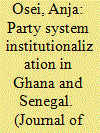|
|
|
Sort Order |
|
|
|
Items / Page
|
|
|
|
|
|
|
| Srl | Item |
| 1 |
ID:
159903


|
|
|
|
|
| Summary/Abstract |
In democracies with stable party systems, voters can more easily trace policy decisions from parties and representatives within the government to specific policy outcomes. Consequently, party system stability (PSS) has been reportedly linked to a variety of factors including economic conditions, democratic performance, political institutions, and socioeconomic cleavages. While informative, these lessons offer precious little insight into other factors that can destabilize a party system. In this work, we surmise that terrorist attacks have important implications for two commonly used measures of PSS. The results of a pooled, cross-sectional time series analysis confirm our hypothesis: deadly attacks proximate to elections destabilize party systems, even when controlling for multiple standard controls. In addition, the level of democratic consolidation within states also influences the degree that fatal terrorist attacks affect party system stability. These findings are based on terrorism data collected from the Global Terrorism Database and from PSS data compiled by the authors.
|
|
|
|
|
|
|
|
|
|
|
|
|
|
|
|
| 2 |
ID:
127760


|
|
|
|
|
| Publication |
2013.
|
| Summary/Abstract |
This paper presents a comparative case study of party system institutionalization in Ghana and Senegal. Both countries experienced a democratic change in government in the year 2000, but while positive development has continued in Ghana, democratic quality in Senegal decreased over time. Can the concept of party institutionalization help to explain this diverging development? Four dimensions of party system institutionalization are systematically compared: regularity, social roots, legitimacy, and party organization. It is found that party competition in Ghana is characterized by high stability and a low number of parties. The major parties are organized throughout the country and have definable support bases with deep historical roots. They give orientation to voters and are perceived as legitimate actors. In Senegal, in contrast, the party system is fluid and less predictable. Parties are not structured along social cleavages and many of them are weakly organized and highly personalistic. In summary, the case studies support the assumption that an institutionalized, well-structured party system in which relevant social cleavages are translated into electoral alternatives is positively related to democratic quality.
|
|
|
|
|
|
|
|
|
|
|
|
|
|
|
|
| 3 |
ID:
082782


|
|
|
|
|
| Publication |
2008.
|
| Summary/Abstract |
Is a higher degree of party and party system institutionalization positively correlated with the consolidation of democracy, defined here as the prevention of democratic breakdown? In order to answer this question, it is useful to compare different levels and types of institutionalization in three Southeast Asian electoral democracies. Institutionalized party systems are characterized, according to Mainwaring and Torcal, by 'stability of interparty competition.' Moreover, the distinction made by Levitsky ('value infusion' versus 'behavioural routinization') with reference to the institutionalization of individual parties will be employed. The empirical research of this paper finds that most Indonesian parties are better institutionalized than those in the Philippines and Thailand with reference to 'value infusion.' In addition, the interparty competition is more stable in Indonesia. Therefore, the probability of a collapse of the party system in the Philippines and Thailand is much higher. This, in turn, renders the democracies in these countries more fragile and prone to political crises or even sudden breakdowns. The early organizational consolidation of social cleavages, such as in Indonesia, enhances institutionalization. A few of the most important parties are socially rooted and have strong linkages to civil and/or religious organizations. Furthermore, the relationship between central and local elites appears to be essential: strong bosses or cliques undermine institutionalization in the Philippines and in Thailand, respectively. However, in recent years there has also been a tendency towards convergence. There are signs of regression in Indonesia, such that the future of the party system is open to question. This article calls for caution with respect to the stated causal relation between institutionalization and democratic consolidation, and it questions some aspects of the concept.
|
|
|
|
|
|
|
|
|
|
|
|
|
|
|
|
|
|
|
|
|